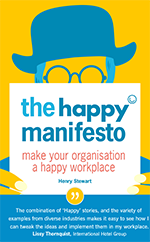Improving Quality of Care by Increasing Joy at Work in the NHS
At Happy our aim is that staff find joy in at least 80% of their work. (And, yes, we do measure it.) So I was delighted to find that an NHS Trust, indeed the one our training centre is based within, has come to the same conclusion and sees Joy in Work as a key driver for improving quality.
Hi, we are Happy
We are leading a movement to create happy, empowered and productive workplaces.
How can we help you and your people to find joy in at least 80% of your work?
Auzewell Chitewe leads quality improvement teams at East London Foundation Trust (ELFT) and is responsible for the Enjoying Work workstream: “It started two-and-a-half years ago, using appreciative enquiry to find out what makes teams work well. And what kept coming up was having joy in their work.”
Permission to try stuff and freedom to fail
“My role is to help teams feel they have permission to try different things. Its not about what the organisation can do for them but about empowering the teams. In healthcare we have what we call ‘wicked’ problems. You can’t solve them doing things the way we always have,” explains Auzewell.
“It’s not about some geniuses figuring out a solution. It is about giving permission to those closest to the problem to come up with solutions, and specifically to involve the service user (or patient) in that solution. They have to have the freedom to fail.”
Creating Joy in Work can be as simple as creating a tuck shop in the office because there are no shops nearby, having pot plants at your desk, working away from the office, a monthly meal out or Fruit Fridays. “Ten improvements like that over the year can make a real difference,” says Auzewell.
Or it can be much bigger, such as ELFT’s violence reduction work.
Reducing violence on wards
The core of ELFT’s work is in community health and mental health, violence against staff was a major problem on mental health wards, leading to low morale and high sickness. The team started with trying to predict violence and find the causes. They created a safety cross to plot which days and times it occurred.
But the key point was when they involved service users. “Where our staff might put one dot on the chart a week, our service users were putting five a day. We realised violence was an even bigger problem for our patients than our staff realised.”
So they involved the service users. They started to check-in on each other, and find ways to make it more homely and talk more with staff so that it wouldn’t feel like a prison. Violence has fallen between 40% and 80%.
“One member of staff told me, when they started working here, they never walked down the corridor on their own. Now it feels safe to work here.”
Involving service users
“One of the great things is that, when service users hear about the Joy in Work programme, they want to be involved. We have one team where the service users provide yoga and pilates classes for our staff.
“At our celebration event for the 21 teams, service users, staff and members of the communities we serve formed a choir and sang to the staff to show how much they appreciated them. Amazing things happen when you give people permission to work on this.”
Measuring Joy in Work
ELFT started two years ago with five prototype teams focusing on creating Joy in Work. There are now 21 teams working on it and Auz predicts at least another 50 in the next round. An Executive Sponsor sits on the Board of the trust to ensure support at the highest levels.
Teams that are involved in the programme track the joy of their staff on a daily basis, using “Good Day Measure” through the ImproveWell app. Everybody answers “how are you feeling” with either a happy or sad symbol and can enter a reason – but only up to five words.
Crucially Joy in Work is one of the priorities for the organisation and is coordinated by the Quality Improvement team. It is seen as a crucial step to improving quality and outcomes for the people they serve. They use the Model for Improvement from the Institute for Healthcare Improvement.
The four key steps are so simple and relatable that they used to be emblazoned on the back of the name badges of people attending some of the Quality Improvement training at ELFT: 1) What are we trying to accomplish?, 2) How will we know that a change is an improvement?, 3) What changes can we make that will result in improvement?, 4) Plan, Do, Study, Act.
Break the rules
ELFT is a trust that seeks active change. One recent campaign was ‘Break the Rules’. “We want people to find a better way, and to test things out. We trust them to do the right thing and so far they have always done the right thing.”
These new ways of working are visible throughout. For instance Auz avoids brainstorming, “as you tend to get the ideas clustering around whatever the most influential or most senior person says.” Instead they use the Nominal Group Technique. People spend one minute on their own, writing down ideas on to a post-it note. They then some time creating an affinity diagram by clustering the post-its together. Then they go round the circle, with each person speaking equally for one minute. “Power is left outside of the room,” explains Auz.
The trust has received widespread recognition. They were named the best place to work in mental health and learning disabilities services in the Health Service Journal and NHS Employers awards 2015. And ELFT was one of the first two mental health trusts in the UK to be designated by the Care Quality Commission as Outstanding in 2016 and kept that rating in 2018. Their view:
“Throughout our inspection we saw evidence of an organisation that operates an inclusive culture, committed to providing the best possible care for patients and a positive atmosphere where both patients and staff feel valued and able to contribute to decision making within the service.”The Care Quality Commission, 2018
Hear more from Auz at our Happy Workplaces Conference
ELFT are keen to spread the word and speak at events about creating Joy in Work. It makes such absolute, simple sense. I know that, if I go to a hospital, what I want to find is staff who feel happy in what they do and feel good about themselves.
Auz will be speaking at our 2020 Happy Workplaces Conference, held at Friends House on Wednesday 17th June at Friends House. Other speakers include Ynzo van Zanten at Tony's Chocolonely and Edel Harris, formerly of Local Cornerstone. Tickets are currently available at our Early Bird price of £295 + VAT each.
Keep informed about happy workplaces
Sign up to Henry's monthly Happy Manifesto newsletter, full of tips and inspiration to help you to create a happy, engaged workplace.

Learn the 10 core principles to create a happy and productive workplace in Henry Stewart's book, The Happy Manifesto.
Henry's Most Popular Blogs
- 8 Companies That Celebrate Mistakes
- 9 Benefits of Having Happy Employees
- 321Zero: How I Solved my Email Overload
- 16 Companies That Don't Have Managers
- 5 Big Companies Who Swear by Mindfulness
- 49 Steps to a Happy Workplace
- A Four Day Week? Let's Start With a Four Day August
- Google: Hire Great People and Give Them Lots of Autonomy
- Buurtzorg: No Managers, Just Great Care From a Nurse-Led Service
- 30 Steps to Joy at Work: Get More Done by Being Less Busy

Henry Stewart, Founder and Chief Happiness Officer
Henry is founder and Chief Happiness Officer of Happy Ltd, originally set up as Happy Computers in 1987. Inspired by Ricardo Semler’s book Maverick, he has built a company which has won multiple awards for some of the best customer service in the country and being one of the UK’s best places to work.
Henry was listed in the Guru Radar of the Thinkers 50 list of the most influential management thinkers in the world. "He is one of the thinkers who we believe will shape the future of business," explained list compiler Stuart Crainer.
His first book, Relax, was published in 2009. His second book, the Happy Manifesto, was published in 2013 and was short-listed for Business Book of the Year.
You can find Henry on LinkedIn and follow @happyhenry on Twitter.
Next Conference: Women in Leadership Online Conference
Save the date for our online conference on 12th November 2025, celebrating women in leadership.
You will hear from inspiring female leaders about how they have created happy and empowered workplaces.
There will be interaction, discussion, space for reflection and opportunities to network with other leaders.
